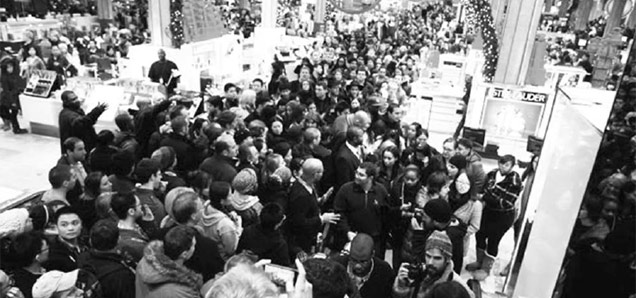Notes From Day Seven: Christmas and hope
 CREDIT: FOXBUSINESS.COM
CREDIT: FOXBUSINESS.COMShoppers can go a little crazy during this time of year. But is shopping really the reason for the season?
We seem to be hard-wired to look for hope. We look for it in a lot of places. We see hope in caring actions when people respond to the pain of victims of catastrophes such as Typhoon Haiyan. Seeing NGOs, GOs, churches, doctors, navy ships and food suppliers band together to help people in trouble is a great source of hope.
Some look for hope in political activism. The magazine Adbusters runs on the hope that political activism is the way forward past the militarism and excessive capitalism its writers see as dangerous (correctly). Along the same lines, not quite as ambitious as Adbusters, others hope that a little parliamentary reform will put us back on track. The recent Senate tempest has given them lots to work with.
Many look for hope in education. Some find hope in military power and the civic religion of military honours. The discovery, construction or validation of personal identity is also seen by many as a source of hope.
And finally, we have to recognize that many of us find hope in getting lots of stuff. The desire for things is what fuels a lot of hard work. Probably the majority of Canadians feel that we are entitled to a reasonably large house, a good car or two, and lots of communications and information gadgetry.
Christmas, a modern gift-getting extravaganza sandwiched between Black Friday and Boxing Day, has become the largest driver of retail sales — the single most important consumer purchasing period — of the calendar year. We consumers hope that the next purchase will give us a good shot of happiness, and when the rush wears off, we tend to go looking for the next thing to buy.
For 2,000 years, Christians have been saying something very unique about where to look for hope. We can often hear thoughtful Protestants and Catholics quoting Augustine. Augustine (354-430 A.D.) lived the life to which a lot of 21st-century college students aspire. It included plenty of partying. But he gave it up. His mother had been praying for God to change him for years and one day her prayers were answered with a yes. Augustine became a theologian, one of the most influential ever, and an active proponent of the church and of the Christian life. One of his most famous lines goes like this. “You have us for yourself, O Lord, and our heart is restless until it rests in you.”
Our restlessness, our hopelessness, ends with God. Hope is found in God. The birth of Jesus Christ brought a new time, a new opportunity, to discover God and hope. How does this new opportunity work? Put very simply, Jesus is God. When we read the accounts of his life and the record of his teachings, we are seeing God. So, when we put our faith in him, and put his teachings into practice, the hope of God embraces us.
And what did the hope of God that Jesus brought look like? Jesus healed many who were ill. He taught with clarity. Many of the well-known stock phrases that we live by such as, “Don't judge others,” and, “Love your enemy,” and, “Let your yes be yes,” come straight from his teachings. Jesus sent hard-nosed religious leaders into a tailspin but welcomed prostitutes, collaborators, thieves, and others who were sorry for their sins. He forgave sins and welcomed all kinds of people. When you read the stories of his travels you discover that people loved being around him. They gave up plenty to get near him. Jesus came with healing, forgiveness, renewal and love.
The hope he brought included, astoundingly, a promise of life after death. This promise arrived, not in the way of mere words, but in the discovery that his grave was empty, and then in the many appearances Jesus made after his death. He had also, before he died, raised a few people from death.
And even more significantly, what Jesus began he will one day finish. He has come once. His second coming will bring on the destruction of all evil. He will bring with him the glory of God. And this time it will fill, not just the villages and country sides he visited, but the whole earth.
So, we are living in an in-between time. Now is the time after Jesus' first arrival, which was the birth we celebrate at Christmas. And at the same time, this is the age before his second coming. A terrific thing for which to hope. Have a wonderful, and hope-filled Christmas.
Editorial opinions or comments expressed in this online edition of Interrobang newspaper reflect the views of the writer and are not those of the Interrobang or the Fanshawe Student Union. The Interrobang is published weekly by the Fanshawe Student Union at 1001 Fanshawe College Blvd., P.O. Box 7005, London, Ontario, N5Y 5R6 and distributed through the Fanshawe College community. Letters to the editor are welcome. All letters are subject to editing and should be emailed. All letters must be accompanied by contact information. Letters can also be submitted online by clicking here.













